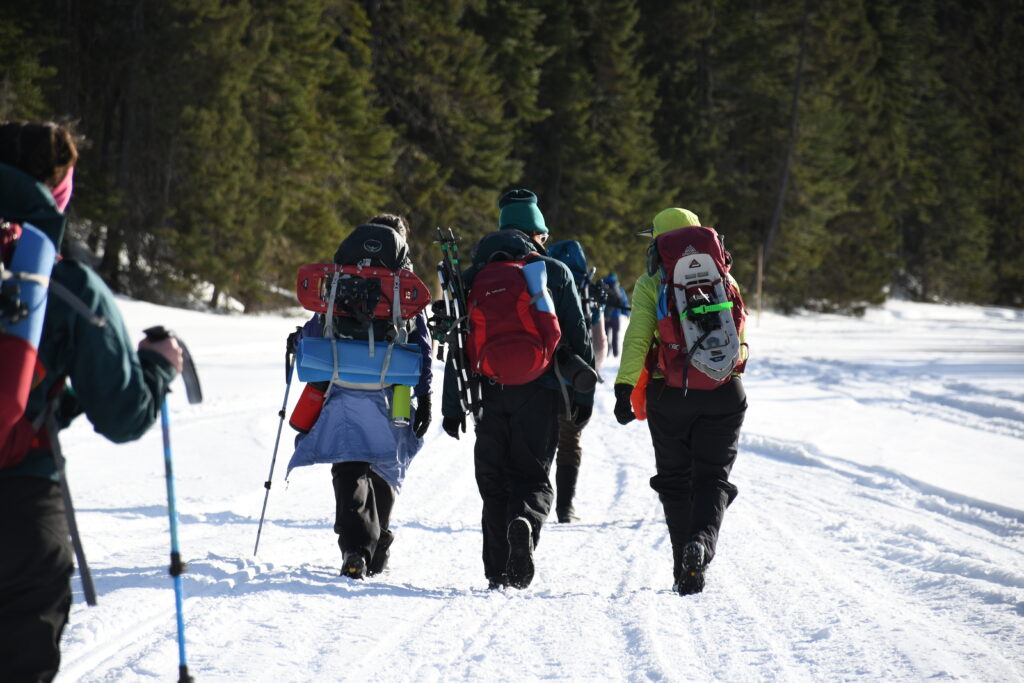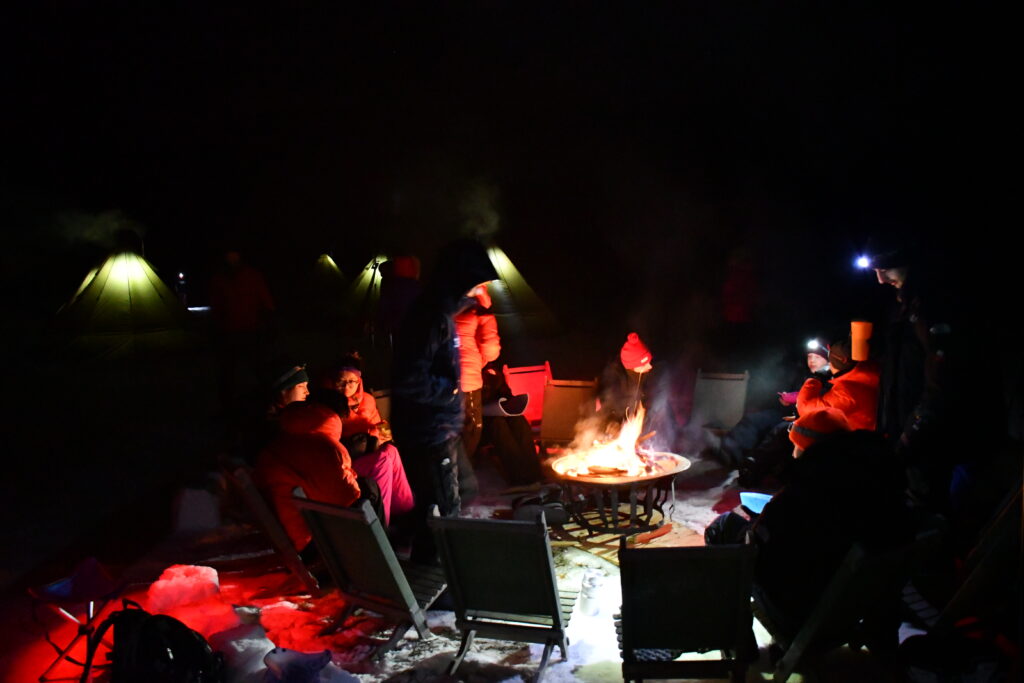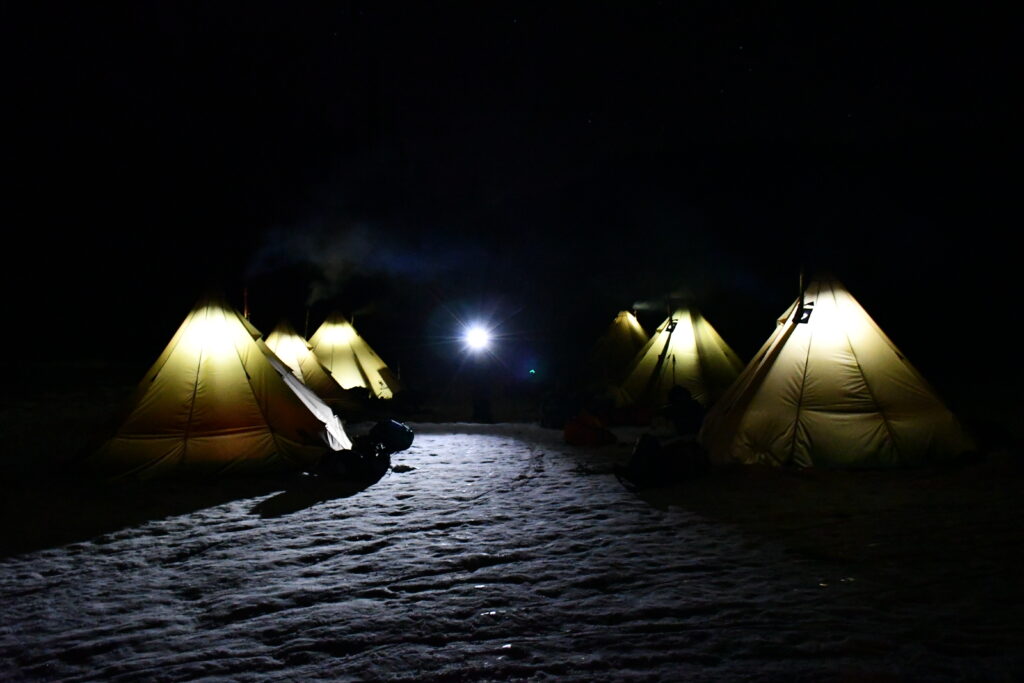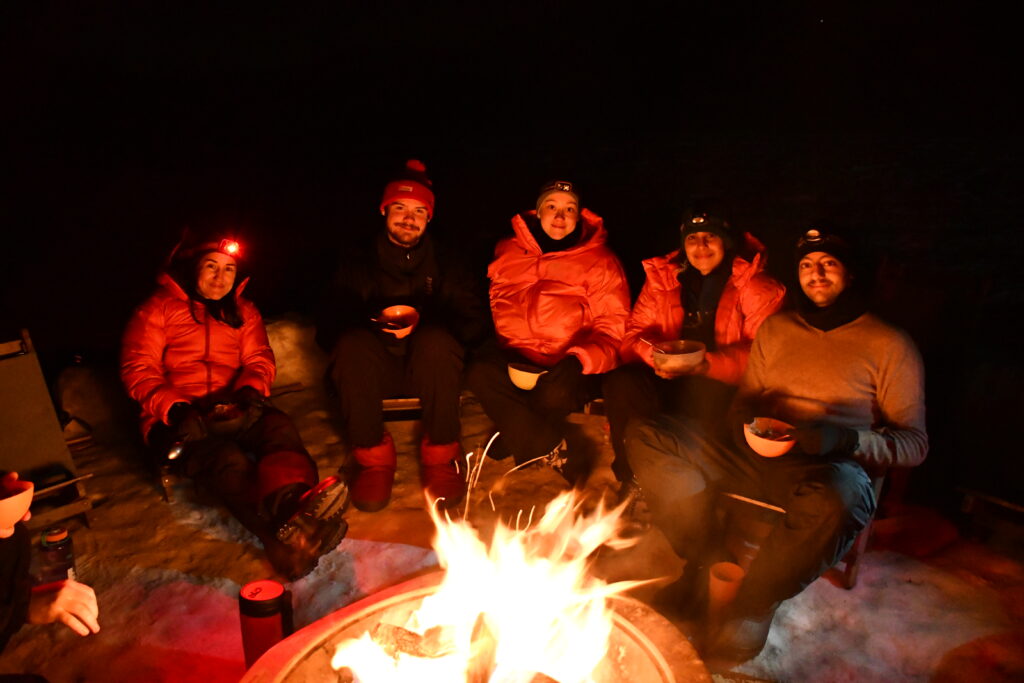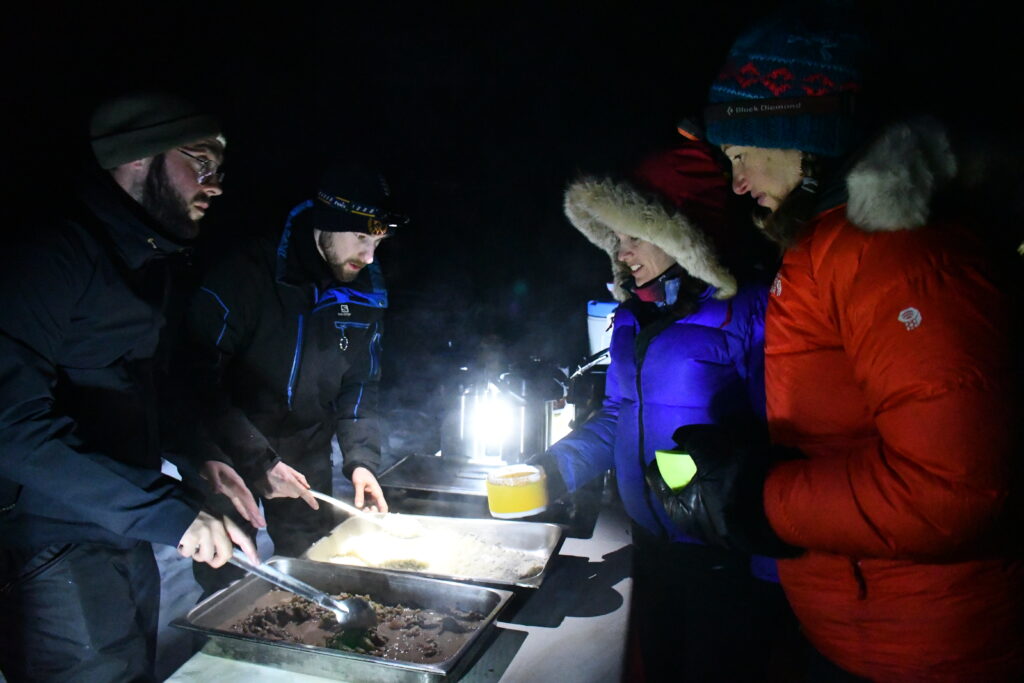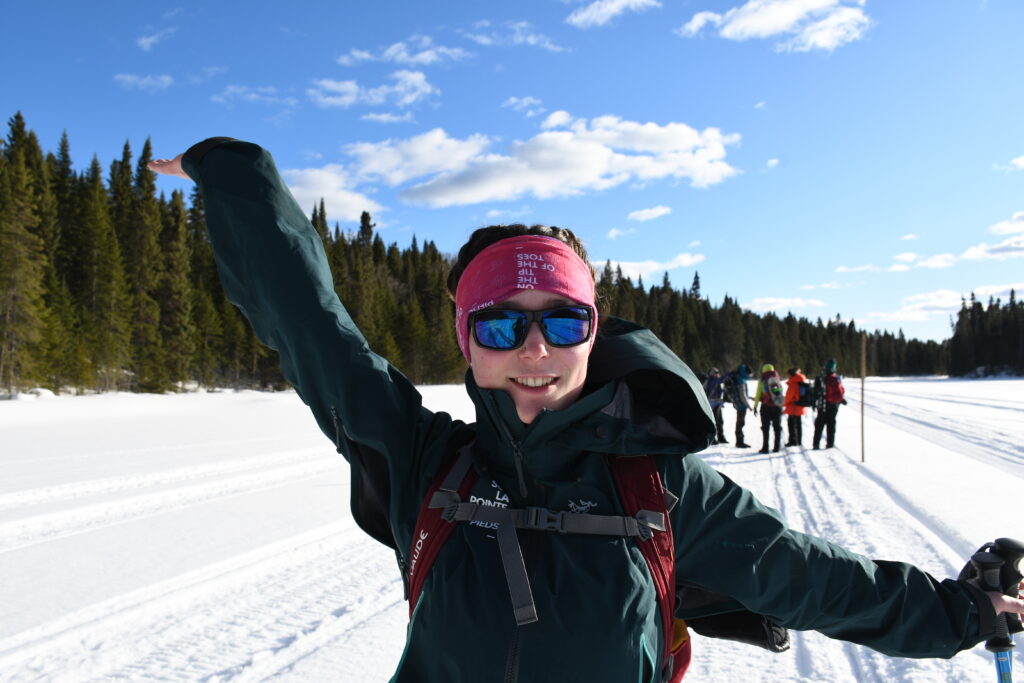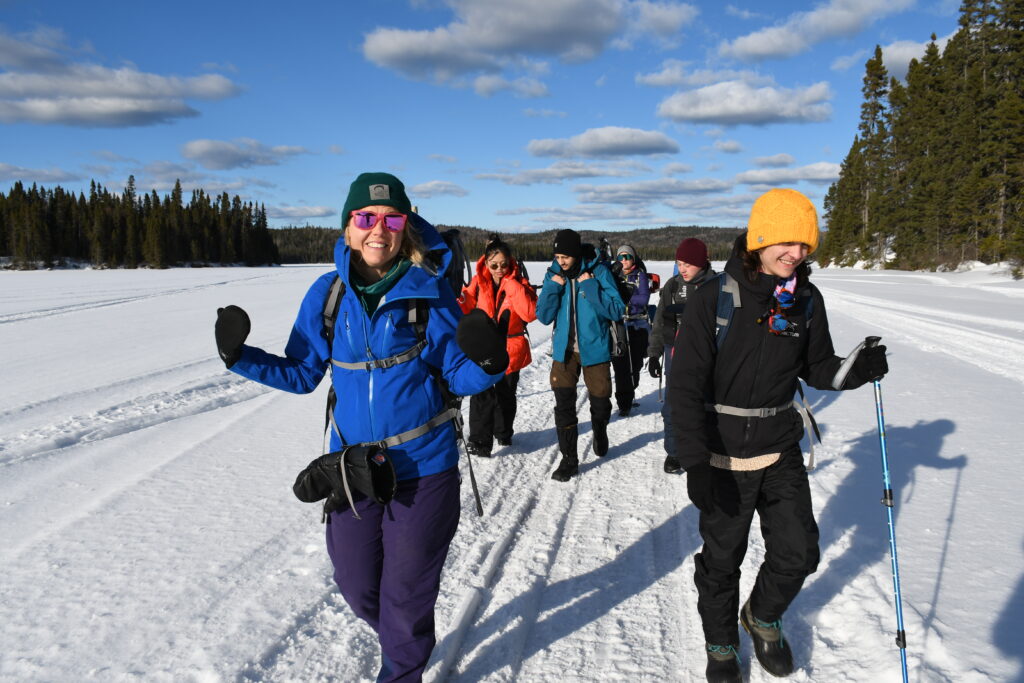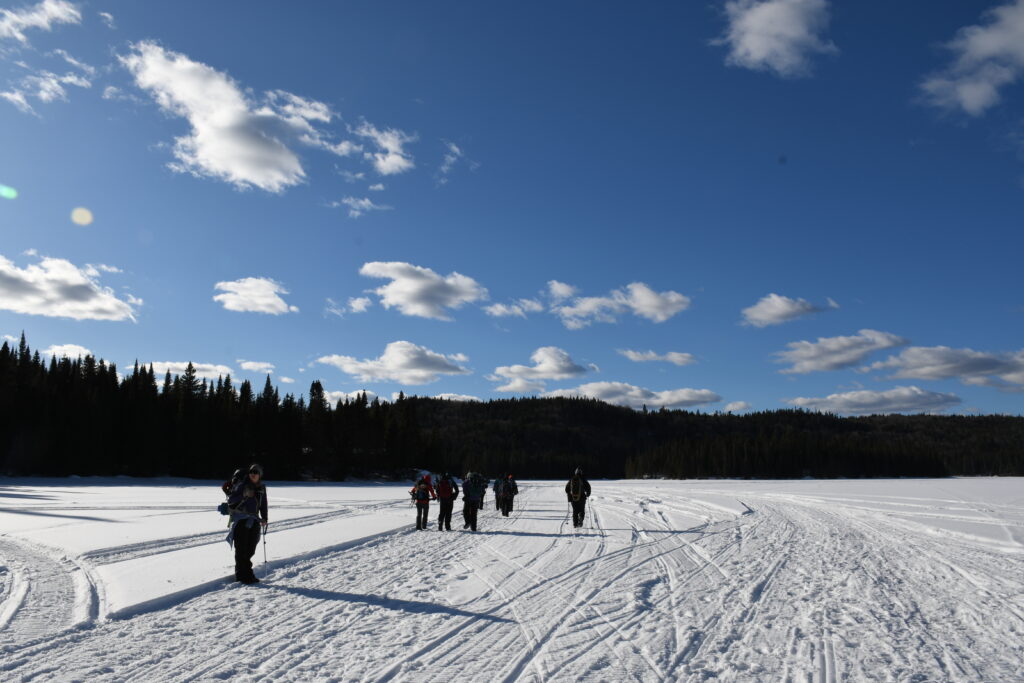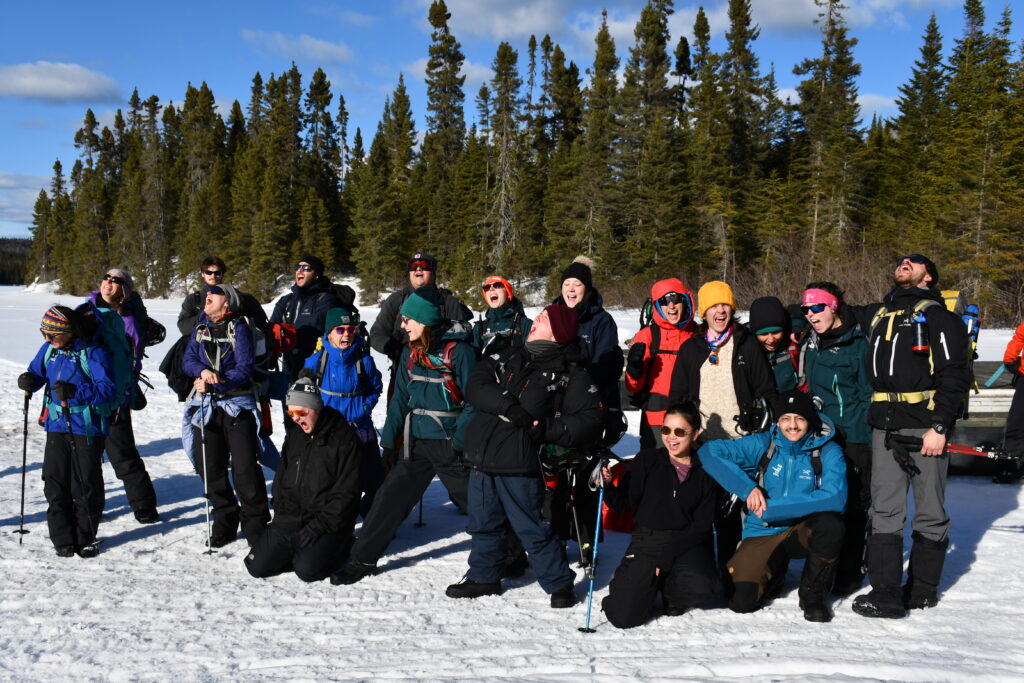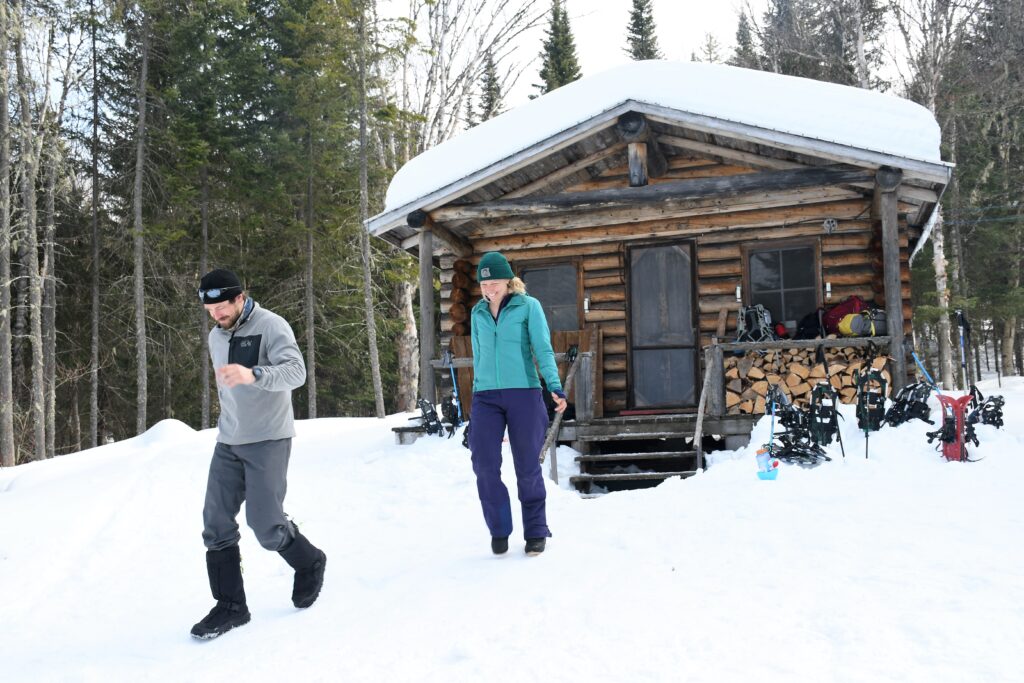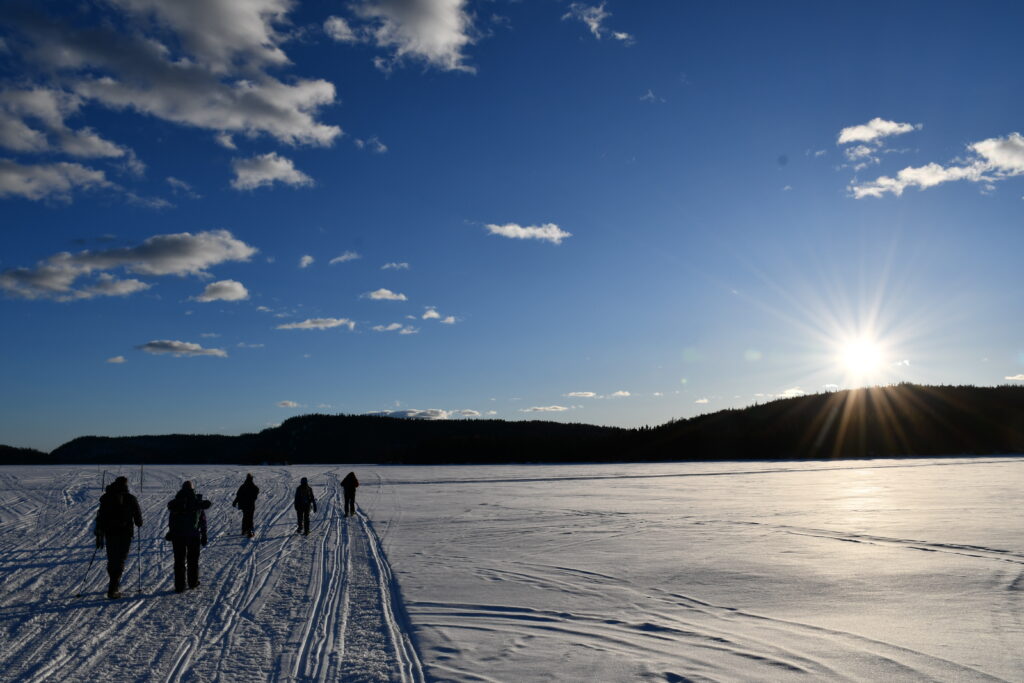This Wednesday morning, the sun came back to find us, this time accompanied by a friend named North Wind. A sweet and salty mix, hot and cold, that brought colour to our cheeks. On the program: walk #6, a few kilometers to our lakeside camp. But first, a discussion. Simple! … What was unexpected is that we started walking around 4:30 p.m. The day turned out differently. Like life. We make plans and they change, we adapt, we learn. Here is the story of a unique day. Among the most beautiful and rich that is possible.
In oatmeal digestion mode, Marie-Michèle taught our new large family the meaning of the name of the On the Tip of the Toes Foundation. We learned that it was created by an oncologist named Sylvain Baruchel. The story goes that one night he lost one of his young patients who should have lived, according to his prognosis. He thought the patient’s body would have been able to get through it, but his mind didn’t follow; he was, in a way, dead from having lost hope. The doctor, a lover of nature, thought that nature would probably have the power to nourish the hope of patients.
Fueled by this conviction, in 1996 he organized a first expedition. It started off big with a crazy trip: they brought 4 young people to the Monts-Groulx to go dog sledding. The place was very unfrequented at the time, so much so that the guides had to tamp down the path at night so that the dogs could run more easily the next day. The result was very positive, and the foundation was born. “On the tip of the toes” refers to the fact that he wanted his patients to rise up and see beyond cancer, because there is more to life beyond all of that. They wanted to bring together young people who have lived with cancer and allow them to connect with other young people who have had a similar experience, a connection which is not possible in hospitals during treatment. This is exactly what we are still doing here today, almost three decades later.
Jessica, our social worker, picked up the ball and opened a door; a very large door, which grew and grew over the hours that followed. She announced the tenor of the proposed discussion: “we would like to give you the chance to make a talking circle about your cancer experience”. She explains that these stories, perhaps already partially shared in the sub-group, can be beneficial for everyone. Speaking would not be obligatory, rather it would be an opportunity. For some it’s been a long time, for others it’s very recent. The question is intentionally broad to let participants approach in the way they choose. In the hospital, we treat the body, but then there is the aftermath when the health system pulls the plug because you are ‘cured’. How this affects mental health in the medium or long term; how we manage all the other aspects of our lives, how we feel, etc.
(…)
In all honesty, I am still trying to come down from all this, from this experience of sharing. It is 10:30 p.m. and it seems like mission impossible to tell you about what we experienced in this cabin. How to find the right words to sum up what happened in more than five hours of discussion and intense listening?
We experienced something profound, that’s for sure: it was touching, difficult, sad, beautiful, rich, frustrating, destabilizing, comforting… There were tears, puffy eyes. A toilet paper roll was passed surreptitiously behind the backs at first but quickly, in response to the growing demand of wet cheeks, it flew from one end of the room to the other like a football. I witnessed almost total soul-baring, nothing subtle, just truth, the buried that comes out, that breathes. I see hands reaching out, fingers clenched, shivers running through bodies, I imagine goosebumps. I see arms reaching over shoulders, heads nodding in active listening, hugs lasting several minutes.
It was raw, unfiltered. Stories of intense pain, waiting for results, frustration, shell or armor to wear to protect those around you, isolation, the impact of Covid, vomit, blood, injections, puncture, medications, depression, false diagnoses, chemo, x-ray, relapse, side effects, loss of self-esteem, desire to die… and so on.
But also solidarity, support, family, hopes, celebrations for small things like eating for yourself, new interests or lifestyles, travels, tomorrows, possibilities, dreams. Some people took it upon themselves to lighten the mood, so we laughed too, sometimes even out loud, like when Nads talked about when she lost all her hair, eyelashes and eyebrows by saying: “some people pay for it, I got it for free! “.
What particularly touched me was when the young people answered each other, when they said things like: “what you’re going through makes me tear up, because it reminds me of my history “. “I understand you so much”. When they reassure each other, encourage each other, tell each other that such and such a reaction or thought is correct, is normal. Also when some use themselves as an example to spread a message of hope and strength. “You can do it! You can live a beautiful, full life, as I am now able to do: you are capable”. This kind of connection, it gives me chills, it makes me sincerely grateful for this moment so strong and important for them… One of the big fellows on the expedition is a happy-go-lucky guy, always laughing; someone says to him: “I’m crying for you man”. That’s mutual aid and connection on another level.
After three hours of discussion and half of the group had spoken, we had to take a lunch break. We continued after lunch; we can walk later. The opportunity to exchange was seized head on. In short, that’s how, one thing and another, we left at 4:30 p.m., leaving a huge weight behind. We burned the cabin and everything we had left there…
… Well, we didn’t really burn it, I don’t need to tell you why, but we thought about it, symbolically. In fact, as an outlet, under a radiant sun of a late winter afternoon, Cathe proposed that we gather and … GO … to shout. Shout as loud as possible, to scream.
It felt good!
The walk went well, the group progressed very quickly. We found our camp bathed in the last rays of the sun. The campfire was already lit and the chimneys of the tents were smoking.
No need to tell you that we ate well. This time, there were thousands of stars over our heads to season our plates and watch over us all night. Building on their earlier experience, everyone prepared confidently for the last evening on the ice. The weather was fine.
As I retired to write at the end of the evening, I heard a burst of laughter in the distance, loud laughter, over and over. The gang was playing, letting go. A good part of the group lay down on a tarp to observe the stars together, I heard them howling at the moon like wolves, laughing and laughing again. After the day we had lived through, these shouts of joy moved me, a lot.
I leave you with wise words heard today from the mouth of David: “Nature does not judge you; she doesn’t judge you, she lives with you”. Spending time in nature, particularly in the context of expeditions, helps people who have experienced cancer to connect with themselves and to define themselves as something other than just “the one who had cancer”. I sincerely believe this.
Families and friends, I send you all warm hugs on behalf of the participants. I guarantee you: they love you so much.
If you are too stirred up by reading today’s post, here’s some advice: pick up the phone and call someone close to you or go out in nature, find yourself a little remote corner and shout. Shout out loud.
Nature will not judge you and it really feels good!
See you tomorrow,
Marie-Helene
Blogger-photographer for the On the Tip of the Toes Foundation
PS: On a completely different note, that life goes on… Pat asked me to send a special message: He wishes a very happy birthday to his loved-one 😊. A thoughtful man!
